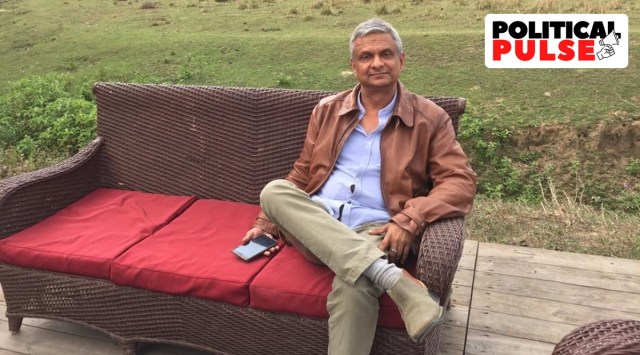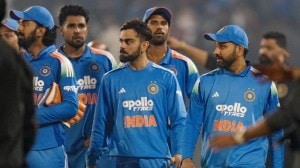In 2016, then Biju Janata Dal (BJD) MP Tathagata Satpathy moved a Private Member’s Bill in the Lok Sabha to decriminalise defamation — the Protection of Speech and Reputation Bill (commonly known as the “Speech Bill”). Satpathy, who is now the editor of Odia daily Dharitri, speaks to The Indian Express about what prompted him to introduce the Bill, its features, the response of other parties, and the effect criminal defamation has in today’s political climate. Excerpts:

What was the Speech Bill about and what prompted you to draft it?
As an editor, I had about 87 defamation cases filed against me. In Odisha, you have a law that women don’t have to deposit money if they want to file a defamation case. Normally, if you want to file a defamation case you have to deposit a certain percentage of what you claim in court. What happens if you level an allegation or publish a story against the police officials and bureaucrats in the newspapers is that they will get their wives or mothers or sisters to file a case against you. Even if you have enough evidence against them, they will file. Eventually, you will get cleared — in my case, I won all the cases if not in the lower court, then in the higher court. But it’s harassment.
So, partly, my Bill was driven by my personal experiences. Because two proceedings, civil and criminal, for the same offence do not seem justified to me. If you look at the global picture, the criminal aspect of the defamation case is not there in any democratic country. The last one I know that had it was Australia but they also removed it a few years ago. In most countries, it’s only the civil part. My simple counter was how can we prosecute twice for the same offence?
I sought the help of lawyers and others, including journalists. Apar Gupta was one of the lawyers who played a key role in drafting that Bill. I may have read the Bill at least 100 times before I went ahead with it. Apar then suggested it would be good if we could put it up for public review, which we did. We had a website — speechbill.in — and sought people’s views also. We received a lot of feedback.
What were the features of the Bill?
The main feature of the Bill was that it decriminalised defamation and treated it as a civil offence. It had provisions to curb the chilling effects of criminal defamation and had provisions to prevent damage to reputations. It had quantification of damages for defamation, fixed the maximum amount of damages, and barred governments and institutions exercising government or statutory functions from filing defamation suits.
How relevant is it in the wake of recent political events?
I did not foresee such an event. I always thought that it is very wrong. Today, everyone seems to have woken up. At the time, the Congress did not support my Bill, no one backed me. But, I wanted to put it on record for posterity at least. I would not say it was a watertight Bill. It needed improvement. But I would like MPs to take it up.
Story continues below this ad
Being an editor, and an active politician not so long ago, what do you think of the position that the right to reputation is no less important a right than the right to freedom of speech?
Right to reputation is a debatable point and that can never ever infringe on freedom of speech or freedom of expression. A statement or a post or a tweet can be said to be hurting someone’s sense and sensibilities. We are seeing it across the country. Then, it is up to them, not to the defendant, to prove how their reputation has been hurt. It’s in the legal process also that during the cross-examination the complainant has to prove how … but all they can do is to find one or two witnesses in their neighbourhood to say ‘yes, we thought bad of her or him because of the remark’.
There are instances of people in power using the defamation law. Do you think it is being used to silence people?
Yes, people in power become super touchy. Some people say vulgar things but defend those by claiming freedom of speech. When someone calls me leftist or presstitute or sickular, I get offended. I am very badly hurt because I do not consider myself as someone selling his pen, I consider myself to be neither secular nor Leftist. Yes, I consider myself a liberal, I agree. I was in the House (Lok Sabha) when a Minister of State uttered the word ‘Presstitute’ on the floor of the House. As an editor and a working journalist, I was hurt. We knew that nothing will come of it. Yes, the same people use defamation clauses against others.
Another thing is that our lower judiciary is not trained to handle so many issues that come up with something like defamation. They are not normal criminal cases but are hypothetical ones. Our lower judiciary is not equipped to handle them. We talk of judicial reforms and the law minister is constantly talking against the collegium. But they are talking about the Supreme Court that they are dealing with every day. But the common Indian does not get to reach the Supreme Court. They are penalised, prosecuted, sentenced, jailed, given life terms, and the appeals take years. Some die in prisons. I would say 99 per cent of our population even. The high courts seem very high. People can afford to go to only the lower courts. I do not think the lower courts can sit in judgment on such delicate issues.
Have you come across instances of defamation clauses being used against political rivals?
I have never experienced (it), at least not in Odisha. But, of course, it comes up against the media. Of late, it has been happening. They are managing to corner opponents that way. The number of defamation cases was much lower 15-20 years back. Either people were gentler or they were not so touchy. If you start taking one line out of a speech, it can work any which way.
Story continues below this ad
You are an editor. Does the new trend make you think twice before criticising someone powerful even if it’s based on fact? Do you think there is increasing fear among citizens about criticising someone or exposing corruption?
Yes, people across India today are much more careful about what they say, especially about politics and politicians. Also about big business. All the powerful people.
You too?
I am a don’t-care-a-hoot kind of person but I refrain from being abusive. I speak what I like and also write what I think is correct. Also, must admit I have personally not felt fear or threatened, as yet.

































